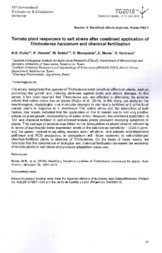Tomato plant responses to salt stress after combined application of Trichoderma harzianum and chemical fertilization.
Tomato plant responses to salt stress after combined application of Trichoderma harzianum and chemical fertilization.
Resumo: It is widely recognized that species of Trichoderma exert beneficial effects on plants, such as promoting the growth and inducing defenses against biotic and abiotic damage. In this sense, it has been reported that Trichoderma spp. are effective in alleviating the adverse effects that saline stress has on plants (Rubio et aI., 2014). In this study, we analyzed the morphological, physiological and molecular changes in chemically fertilized and unfertilized tomato plants in response to T. harzianum T34, saline stress and the interaction of both factors. Our results indicated that the application of T34 to tomato seeds had very positive eftects on plant growth, independently of saline stress. However, the combined application of T34 and chemical fertilizer in salt-stressed tomato plants produced decaying symptoms in plants. This damage phenotype was linked to the deregulation of phytohormone networking in terms of significantly lower expression levels of the salt overlay sensitivity 1 (SOS1) gene, and the genes involved in signaling abscisic acid-, ethylene-, and salicylic acid-dependent pathways and ROS production, in comparison with those observed in salt-challenged chemical-fertilized plants in absence of Trichoderma. On the basis of these results, we conclude that the combination of biological and chemical fertilization increases the sensitivity of tomato plants to salt stress and prevents adaptative responses.
Ano de publicação: 2018
Tipo de publicação: Resumo em anais e proceedings
Unidade: Embrapa Meio Ambiente
Observações
1 - Por padrão são exibidas publicações dos últimos 20 anos. Para encontrar publicações mais antigas, configure o filtro ano de publicação, colocando o ano a partir do qual você deseja encontrar publicações. O filtro está na coluna da esquerda na busca acima.
2 - Para ler algumas publicações da Embrapa (apenas as que estão em formato ePub), é necessário ter, no celular ou computador, um desses softwares gratuitos. Sistemas Android: Google Play Livros; IOS: iBooks; Windows e Linux: software Calibre.
Acesse outras publicações
Acesse a Base de Dados da Pesquisa Agropecuária (BDPA) para consultar o acervo completo das bibliotecas da Embrapa.

